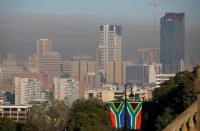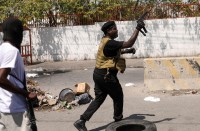The government of South Sudan agreed on Sunday (September 4) to accept 4,000 extra peacekeepers in a bid to avoid an arms embargo threatened by the United Nations Security Council, but said the details of the deployment were still being discussed.
The announcement came after a meeting in the South Sudanese capital, Juba, between President Salva Kiir and the U.N. Security Council, led by U.S. Ambassador Samantha Power.
Cabinet Affairs Minister Martin Elia Lomuro said at a news conference with Power that Juba had given the green light for the extended peacekeeping force.
The 15-member council last month authorised the deployment of a 4,000-strong regional protection force as part of the U.N. peacekeeping mission already on the ground, known as UNMISS. It threatened to consider an arms embargo if Kiir’s government did not cooperate.
“The number one obstacle to fulfilling that mandate up to this point has been the severe restrictions on their movement, the requirement of written permission before they move from point A to point B. And we are very encouraged that President Kiir was very clear in the meeting that that is not his intention, that he has asked that UNMISS to be granted free movement and that humanitarian actors to be able to provide relief to those in need, no matter where they are, no matter where they come from,” Power said.
The council authorized the new force following several days of heavy fighting involving tanks and helicopters in Juba in July between troops loyal to Kiir and those backing former Vice President Riek Machar. The violence raised fears of a return to full scale civil war in the world’s newest nation.
U.N. peacekeepers have been deployed in South Sudan since 2011, when the country gained independence from Sudan.
Political rivalry between Kiir and Machar sparked a civil war in 2013, but while the pair signed a shaky peace deal a year ago, fighting has continued and Machar fled the country after the eruption of violence in July.
(c) Copyright Thomson Reuters 2016








